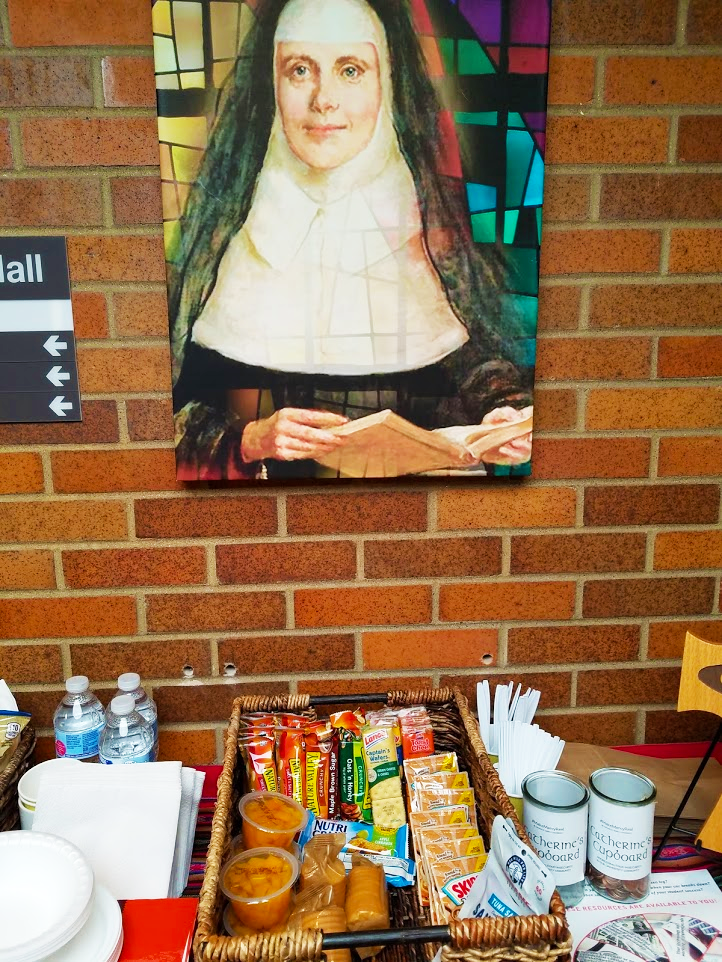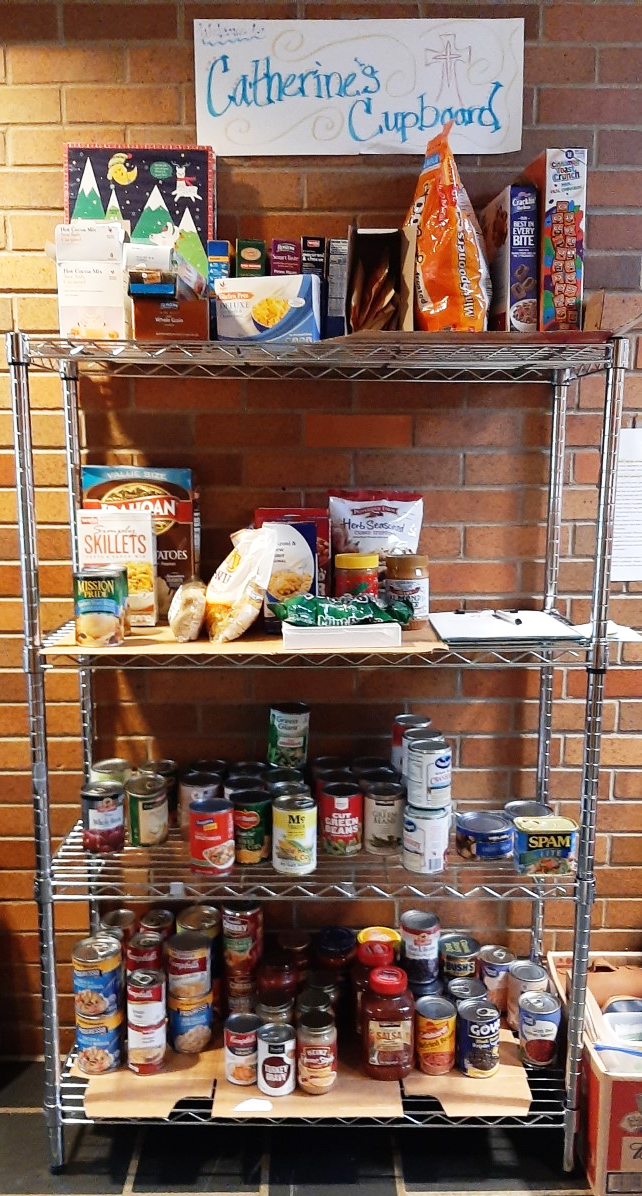
A portrait of Catherine McAuley, foundress of the Sisters of Mercy, overlooks a table at Catherine’s Cupboard, a food pantry for students at Gwynedd Mercy University in Montgomery County. In recent years, food insecurity has increased on college campuses. (Photo courtesy of Betsy Stone Plummer/Gywnedd Mercy University)
A pantry at a Catholic college in Montgomery County is reaching food-insecure students while creating a new model for addressing hunger on campus.
For the past five years, Catherine’s Cupboard at Gwynedd Mercy University has been providing students with an array of non-perishable groceries, grab-and-go portions and even household items. Thanks to the recent addition of refrigeration units, selections also include fresh foods.
The pantry’s name honors Catherine McAuley, foundress of the Sisters of Mercy congregation, the Merion-based community of which established the university in 1948.
Not unlike McAuley’s own mission to the poor of Dublin, Ireland, the cupboard has steadily grown into an essential resource, and one that also connects clients with long-term community support in both Montgomery and Bucks County.
Assistance is discreet, with only student identification required for admission to the pantry, located in the university’s campus ministry building. Prospective clients can simply email inquiries about the cupboard before making an actual visit.
That “low-key” approach is crucial to ensuring students are “treated with dignity and respect,” said Betsy Stone Plummer, Gwynedd Mercy’s assistant director of campus ministry for community service.
Although some clients have had prior experience in receiving social services aid, “for many, it’s the first time they’ve ever had to access help,” she said. “It’s very emotional to be fed by somebody else, and it’s very personal.”
The popular image of the starving college student, with its underlying view of hunger as a campus rite of passage, masks the complex demographics of those actually enrolled in higher education, Plummer noted.
[hotblock]
“A large number of students are providing for more than just themselves,” she said. “Often, their studies are not a direct path (to graduation).”
A 2018 report by the U.S. Governmental Accountability Office found that 71% of today’s college students are “nontraditional,” with an average age of 26. Some 22% have dependent children, and well over half work at least part-time; one quarter have a full-time job.
Those responsibilities, coupled with coursework, can stretch students’ resources to their limits, said Plummer.
Moreover, the financial dynamics of higher education have created a kind of perfect storm for food insecurity, said Gwynedd Mercy trustee John C.S. Kepner, a retired health care executive, consultant and attorney.
Amid “a dramatic increase in low-income college students,” tuition costs have soared while federal and state funding of higher education has scaled back, he said.
“The resulting gap between financial aid and college costs is growing,” said Kepner. “The problem is broad-based, cutting across community and four-year colleges, including even top universities.”
As a result, many students find themselves regularly asking how they will “put food on the table by the end of the week,” Plummer said.

A rack of non-perishable food items is seen at Catherine’s Cupboard, a food pantry for students at Gwynedd Mercy University. (Betsy Stone Plummer/Gwynedd Mercy University)
While research is still ongoing, recent data suggests that low-income and marginalized students are most at risk for food insecurity, with many either unaware of or ineligible for federal Supplemental Nutrition Assistance Program (SNAP) benefits.
The lack, which COVID has only compounded, can quickly spiral, said Kepner.
“Students who are food insecure are more likely to also be impacted by housing and other issues, which reduce their chances of becoming academically successful,” he said.
To better tackle the problem, Gwynedd Mercy, Montgomery County Community College (MC3) and the Lansdale nonprofit Manna on Main Street participated in a 2018-2019 consortium project that assessed student food insecurity.
Additional partners (among them, the Montgomery County Office of Housing and Community Development) later signed on, all working to create what Kepner calls a “sustainable model which deals comprehensively with student food and housing insecurity” on campus.
As part of the effort, a 2021-2022 pilot project at both Gwynedd Mercy and MC3 will feature a research study, remote food ordering and delivery, affordable housing and anti-racism support, among other elements, said Kepner.
Once proven, he said, the template can then “be scaled across Montgomery County and (replicated) across the Commonwealth of Pennsylvania and other regions.”
In that way, said Kepner, students will be empowered to “succeed academically, in life and as contributing citizens, thereby breaking the cycle of poverty.”
For those who are already parents, he added, “the program should have intergenerational impact.”
McAuley, who dedicated herself to serving the impoverished, would have approved, said James Gallo, Gwynedd Mercy’s vice president for mission integration.
“She founded the sisters almost 200 years ago in Dublin to care for the poor of the city,” he said. “She would say, ‘The poor need help today, not next week.’”
PREVIOUS: Racial healing to come by prayer, Spirit-led action, speaker says
NEXT: Archdiocese names Danielle Heeney new head of special education


Share this story